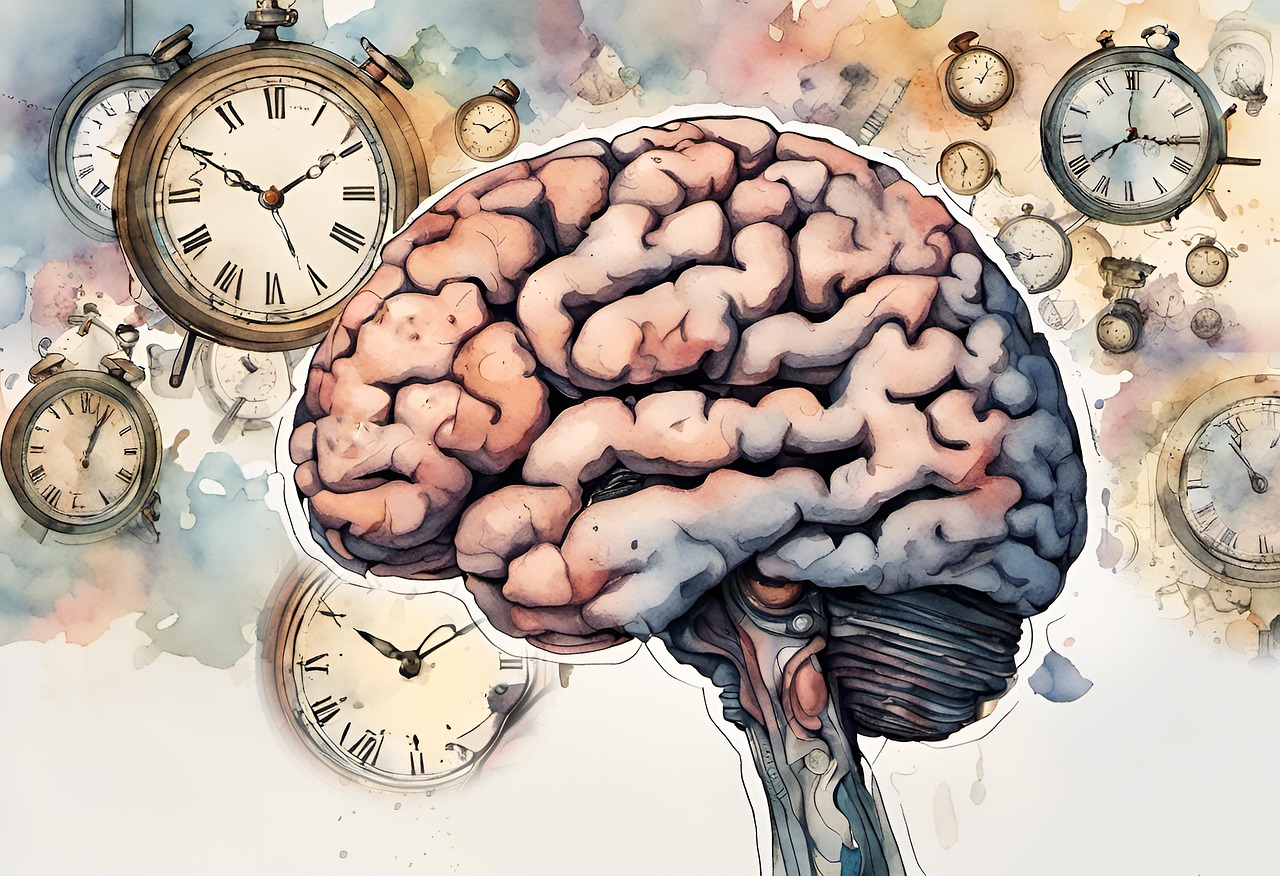
By Inge Bundchen, Psychiatric Nurse Practitioner | 15+ Years Specializing in Cognitive Health for Seniors
You walk into a room and completely forget why you’re there.
You can’t remember the name of that actor—the one you’ve seen in dozens of movies.
You read the same paragraph three times and still have no idea what it says.
Mid-sentence, the word you need just… vanishes.
And the scary thought creeps in: “Is this the beginning of dementia?”
Let me give you some immediate relief:
Brain fog after 50 is extremely common, and in most cases, it’s NOT dementia or Alzheimer’s disease.
I’m a psychiatric nurse practitioner who has spent over 15 years working with patients experiencing cognitive changes, and I can tell you with confidence: brain fog is usually a symptom of something fixable, not a sign of inevitable decline.
But here’s the truth nobody tells you: Brain fog is also not “just part of aging” that you have to accept.
Your mind deserves to feel sharp, clear, and capable. And with the right information and tools, you can absolutely get there—sometimes in a matter of weeks.
Let me show you what’s really happening in your brain, and more importantly, what you can do about it.
What Brain Fog Actually Is (In Plain English)
First, let’s define what we’re talking about.
Brain fog isn’t a medical diagnosis—it’s a collection of cognitive symptoms that include:
- Mental fatigue – Even simple tasks feel exhausting
- Poor concentration – You can’t focus on one thing for more than a few minutes
- Memory problems – Especially short-term memory and word retrieval
- Slowed thinking – It takes longer to process information or respond
- Lack of mental clarity – Your thoughts feel fuzzy or clouded
- Difficulty making decisions – Even small choices feel overwhelming
Here’s what brain fog is NOT:
- Forgetting where you put your keys occasionally (that’s normal)
- Taking a moment to remember someone’s name (also normal)
- Needing to reread complex material (happens to everyone)
Brain fog is when these issues:
- Happen multiple times every day
- Interfere with your normal functioning
- Represent a noticeable change from your baseline
- Make you feel “not like yourself”
One of my patients described it perfectly: “It’s like someone put a thin veil between me and the world. Everything takes more effort. I know I’m smart, but I can’t access it anymore.”
If that resonates with you, keep reading.
The 6 Hidden Causes of Brain Fog After 50 (That Doctors Often Miss)
Cause #1: Hormone Changes Are Literally Changing Your Brain
The truth about menopause and cognition:
When your estrogen levels drop during perimenopause and menopause, it’s not just causing hot flashes and mood swings. Estrogen is a neuroprotective hormone—meaning it protects and enhances brain function.
What estrogen does for your brain:
- Increases blood flow to the brain
- Supports the production of neurotransmitters (especially acetylcholine, which is crucial for memory)
- Protects brain cells from inflammation
- Enhances the connections between neurons
When estrogen drops, all of these protective effects decline, and brain fog can result.
The good news: Research published in Menopause: The Journal of The North American Menopause Society shows that cognitive symptoms typically improve 1-2 years after menopause as your brain adapts to the new hormone levels.
My approach: I do not recommend hormone therapy for women over 50 as there are serious risks such as blood clots and stroke in this age group. However, there are other things you can do:
- Support your brain with phytoestrogens (plant-based estrogens) from foods like flaxseeds, soy, and chickpeas
- Be patient with yourself during this transition—it’s temporary
Important note: If you’re over 60 and suddenly developing brain fog, hormones may not be the primary cause. Keep reading for other factors.
Cause #2: Your Medications Are Clouding Your Mind
This is one of the most overlooked causes of brain fog in people over 60, and it makes me frustrated with the healthcare system.
Common medications that cause brain fog include:
Anticholinergics (these block acetylcholine, your memory neurotransmitter):
- Antihistamines like Benadryl (diphenhydramine)
- Overactive bladder medications like Ditropan (oxybutynin)
- Some antidepressants like Elavil (amitriptyline)
- Sleep aids like Unisom
Other culprits:
- Benzodiazepines (Xanax, Ativan, Klonopin)
- Prescription sleep medications (Ambien, Lunesta)
- Opioid pain medications
- Some blood pressure medications (especially older beta-blockers – generic names ending in “olol”)
- Statins (for some people)
- Anticonvulsants used for nerve pain
The problem: Many people over 60 are taking multiple medications, and the combined effect (called “polypharmacy”) can significantly impair cognition.
What to do:
- Make a list of ALL your medications (including over-the-counter)
- Ask your doctor or pharmacist: “Could any of these be causing cognitive side effects?”
- Request a medication review at least annually
- Never stop medications without medical guidance
My approach: As a psychiatric prescriber, I always choose medications with the lowest cognitive impact for my patients over 60. There are almost always alternatives.
Cause #3: Chronic Inflammation Is “Inflaming” Your Brain
Here’s something that surprised me when I first learned it in my brain longevity certification training: Inflammation in your body creates inflammation in your brain.
When your body is dealing with chronic inflammation (from conditions like arthritis, autoimmune disease, gut issues, or even gum disease), inflammatory molecules called cytokines cross the blood-brain barrier and trigger neuroinflammation.
Neuroinflammation is behind these cognitive issues:
- Slowed neural processing
- Reduced neurotransmitter production
- Damaged brain cell connections
- Memory and concentration problems
Common sources of inflammation after 50:
- Poor diet (high in sugar, processed foods, and refined carbs – sugar is toxic to your brain!)
- Chronic pain conditions
- Autoimmune diseases (thyroid problems, rheumatoid arthritis, lupus)
- Poor gut health (leaky gut, dysbiosis)
- Chronic stress
- Poor sleep
- Sedentary lifestyle
What the research shows: Research published in Brain, Behavior, & Immunity – Health analyzed data from over 39,000 adults and found that higher C-reactive protein levels were associated with poorer performance on tests of fluid intelligence and numeric memory, even after accounting for age and other health factors (Mendelson et al., 2023).
Anti-inflammatory strategies that work:
- Follow a Mediterranean-style diet rich in omega-3 fatty acids, colorful vegetables, and olive oil
- Reduce sugar and processed food intake
- Address gut health with prebiotics and fermented foods
- Incorporate anti-inflammatory herbs like turmeric (with black pepper for absorption)
- Move your body regularly—exercise is one of the most powerful anti-inflammatory interventions
Lab tests to request: Ask your doctor to check your C-reactive protein (CRP) and other inflammatory markers.
Cause #4: Your Thyroid Is Quietly Malfunctioning
Thyroid disorders are incredibly common in women over 50, and hypothyroidism (underactive thyroid) is notorious for causing brain fog.
Why thyroid affects your brain:
Your thyroid hormones regulate metabolism in every cell of your body—including your brain cells. When thyroid function is low, your brain literally slows down.
Classic symptoms of hypothyroidism beyond brain fog:
- Unexplained weight gain
- Constant fatigue (no matter how much you sleep)
- Feeling cold all the time
- Dry skin and hair
- Depression or low mood
- Constipation
- Puffy face
The tricky part: Many doctors only test TSH (thyroid stimulating hormone) and consider you “fine” if it’s in the normal range. But optimal thyroid function requires looking at the full picture.
What to request:
- Complete thyroid panel: TSH, Free T3, Free T4, Reverse T3, and thyroid antibodies
- Optimal ranges (not just “normal” ranges)—your TSH should ideally be between 1-2, not just under 4.5
Treatment options:
- Thyroid replacement medication (such as levothyroxine – Synthroid)
- Addressing nutrient deficiencies that affect thyroid function (selenium, zinc, iodine, vitamin D)
- Reducing thyroid-disrupting chemicals in your environment
Personal note: I’ve seen countless women get their mental clarity back within 4-6 weeks of properly treating their thyroid. Don’t let this one go undiagnosed.
Cause #5: You’re Not Sleeping (And Your Brain Is Paying the Price)
Here’s a hard truth: Your brain cleans itself while you sleep.
During deep sleep, your brain’s glymphatic system—essentially a waste removal system—flushes out toxins, including amyloid-beta proteins that are linked to Alzheimer’s disease.
When you don’t get enough quality sleep (especially deep and REM sleep), these toxins accumulate, and you experience:
- Brain fog
- Poor memory consolidation
- Slowed reaction time
- Difficulty learning new information
- Emotional dysregulation
Sleep problems after 50 are complex because:
- Menopause disrupts sleep architecture
- Medications can interfere with sleep quality
- Sleep apnea becomes more common
- Anxiety and nighttime worries increase
- Chronic pain disrupts sleep
- Bladder issues cause nighttime waking
The minimum you need: Most adults need 7-9 hours of sleep, but quality matters more than quantity. You need sufficient time in both deep sleep (for physical restoration and waste removal) and REM sleep (for memory consolidation and emotional processing).
Solutions to explore:
- Rule out sleep apnea with a sleep study (especially if you snore or wake unrefreshed)
- Address nighttime anxiety (see my article “Why Your Anxiety Gets Worse at Night”)
- Create a consistent sleep schedule (same bedtime and wake time daily)
- Consider magnesium glycinate supplementation (400mg before bed)
- Try herbal sleep support like passionflower, chamomile and lavender
Cause #6: Nutritional Deficiencies Are Starving Your Brain
Your brain uses 20% of your body’s total energy despite being only 2% of your body weight. It’s metabolically hungry and needs specific nutrients to function optimally.
The most common deficiencies causing brain fog:
Vitamin B12 (critical for nerve function and neurotransmitter production)
- Deficiency symptoms: Brain fog, memory problems, numbness, fatigue
- Why it’s common after 50: Stomach acid decreases with age, reducing B12 absorption. Proton pump inhibitors such as pantoprazole also interfere with B12 absorption.
- Solution: Get levels tested (optimal is >500 pg/mL); supplement with methylcobalamin (B12) sublingual
Vitamin D (affects over 1,000 genes, including brain health genes)
- Deficiency symptoms: Brain fog, depression, poor immunity
- Why it’s common: Less sun exposure, reduced skin synthesis with age
- Solution: Test levels (optimal is 50-80 ng/mL); supplement with D3 + K2
Omega-3 fatty acids (EPA and DHA build brain cell membranes)
- Deficiency symptoms: Brain fog, poor memory, mood issues
- Why it’s common: Low fish intake, poor conversion from plant sources
- Solution: Eat fatty fish 2-3x/week or take high-quality fish oil (2,000mg combined EPA/DHA)
Iron (especially in women with heavy periods during perimenopause)
- Deficiency symptoms: Severe fatigue, brain fog, poor concentration
- Solution: Test ferritin levels (optimal >50 ng/mL); supplement if needed with food-based iron
Magnesium (involved in over 300 enzymatic reactions, including brain function)
- Deficiency symptoms: Brain fog, anxiety, poor sleep, muscle cramps
- Why it’s common: Depleted soils, stress, medications, poor diet
- Solution: Magnesium glycinate 400-600mg daily
Important: Always test before supplementing at high doses, and work with a knowledgeable practitioner.
Brain fog doesn’t have to be your future.
With the right knowledge, tools, and commitment to your cognitive health, you can reclaim—and even enhance—your mental clarity.
Your brain is waiting for you to give it what it needs to thrive.
Stay tuned for my next blog post: How to Fix Brain Fog: The 8-Week Brain Clarity Protocol
Key Studies on CRP and Cognitive Performance:
1. Most Recent Large Study (2023):
Mendelson et al., “C-Reactive protein and cognition: Mediation analyses with brain morphology in the UK Biobank”
- Published in: Brain, Behavior, & Immunity – Health, Volume 31, 2023
- Study size: 39,200 participants
- Finding: CRP levels had small, negative associations with fluid intelligence and numeric memory after accounting for age, sex, and medical diagnoses C-Reactive protein and cognition: Mediation analyses with brain morphology in the UK Biobank – ScienceDirect
- Link: https://www.sciencedirect.com/science/article/pii/S2666354623000789
- PubMed: https://pmc.ncbi.nlm.nih.gov/articles/PMC10362544/
2. Longitudinal Study (2021):
Cao et al., “Longitudinal associations between C-reactive protein and cognitive performance in normative cognitive ageing and dementia”
- Published in: Age and Ageing, 2021
- Study size: 3,563 older adults (ages 65-101)
- Finding: Elevated serum CRP was associated with poorer cognitive functioning and increased dementia risk across 10-year follow-up Longitudinal associations between C-reactive protein and cognitive performance in normative cognitive ageing and dementia – PubMed
- PubMed: https://pubmed.ncbi.nlm.nih.gov/34324642/
3. REGARDS Study (2020):
Walker et al., “C-reactive protein and risk of cognitive decline”
- Published in: PLOS One, 2020
- Study size: 21,782 adults aged 45+
- Finding: Higher CRP associated with faster cognitive decline over 12 years
- Link: https://journals.plos.org/plosone/article?id=10.1371/journal.pone.0244612
What brain fog symptoms are you experiencing? Have you identified any patterns or triggers? Share your experience in the comments—your insights might help someone else feel less alone.
It’s Almost Here!
If you’re a woman over 60 and are ready for comprehensive support in transforming your relationship with sleep, check out my new Sweet Dreams After 60 course, coming mid October 2025.
Disclaimer: This article is for educational purposes only and does not constitute medical advice. Brain fog can be a symptom of serious medical conditions that require professional evaluation. Always consult with qualified healthcare providers before starting any new supplements, making medication changes, or implementing significant dietary or lifestyle modifications. If you’re experiencing progressive cognitive decline, sudden confusion, or other concerning neurological symptoms, seek immediate medical evaluation.
Brain Fog After 50? Here’s What’s Really Happening
October 14, 2025
meet inge
I’m Inge, a Psychiatric Nurse Practitioner passionate about helping others feel grounded, resilient, and well. Here on the blog, I share insights on mental health, prevention, meditation, clean skincare, and nutrition—everything I turn to in my own daily life. I hope this space becomes a trusted part of your wellness journey.
LATEST FROM THE BLOG

I had a friend tell me something last week that stopped me in my tracks. She said, “I feel like I’m drowning in other people’s thoughts.” She’s 67, retired from teaching, and spends hours each day scrolling through news apps, checking Facebook, watching YouTube videos about gardening (her passion), and texting with her grandchildren. All […]


When Your Body Remembers What Your Mind Tries to Forget Have you ever noticed how grief settles into your shoulders? How anxiety lives in your chest like a bird that won’t stop fluttering? Or how years of unspoken words seem to tighten around your throat? If you’re nodding right now, you’re not imagining things. Your […]

Postmenopausal women often face unique challenges, one of the most pervasive being insomnia. As hormonal shifts disrupt sleep patterns, sleepless nights can become all too familiar, leading to daytime fatigue and a decline in overall well-being. But rest assured, effective strategies exist to reclaim restful nights. By understanding the underlying factors contributing to insomnia, from […]

You’ve learned about breathing techniques, herbs, exercise, self-compassion, and creating a calm environment. Each of these tools can help reduce anxiety. But how do you put them all together into a sustainable system that actually works in your daily life? That’s where an anxiety management plan comes in. An anxiety management plan isn’t about adding […]